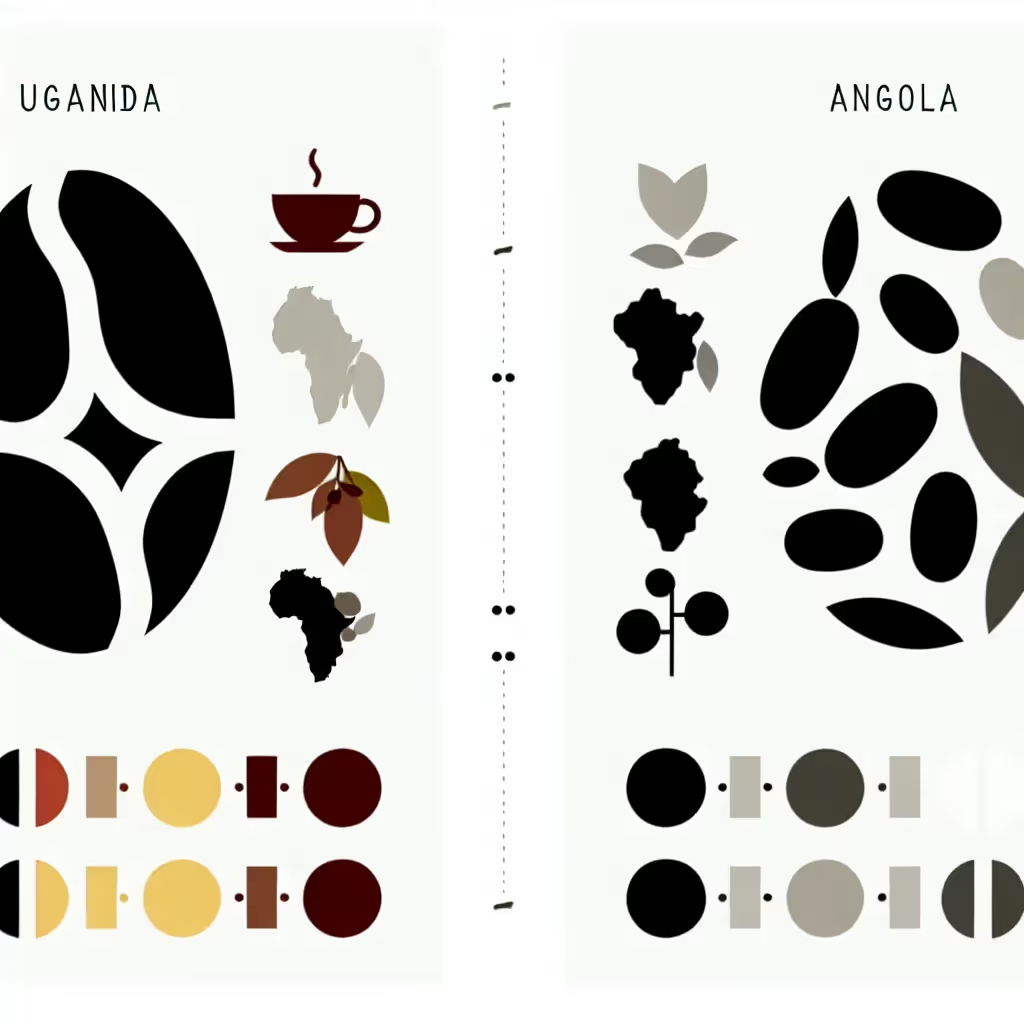Ugandan Vs. Angolan Coffee
This comparison explores the unique qualities of Ugandan and Angolan coffee, highlighting their flavor profiles, growing conditions, and cultural significance in the specialty coffee market.

Brief Description
Ugandan coffee, particularly from the Mount Elgon region, is known for its rich, full-bodied flavor profile with a distinctive wine-like acidity. Grown in the fertile volcanic soils of Eastern Uganda, these beans benefit from high altitudes and ample rainfall. The result is a complex cup with notes of dark chocolate, citrus, and sometimes a subtle floral undertone. Ugandan coffee has been gaining recognition in the specialty coffee market for its unique characteristics and improving quality standards.
Angolan coffee, once a powerhouse in the global market, is making a comeback after years of civil war. Known for its rich history and unique terroir, Angolan coffee offers a blend of earthy robusta and fruity arabica flavors. The country's diverse microclimates and traditional farming methods contribute to a coffee with distinct character, often featuring notes of chocolate, nuts, and subtle fruitiness. As Angola rebuilds its coffee industry, it's becoming an exciting origin for coffee enthusiasts seeking new and rediscovered flavors.
Importance of Comparison
Comparing Ugandan and Angolan coffee is crucial for coffee enthusiasts seeking to explore diverse African origins. These two countries represent different coffee-growing traditions and flavor profiles, offering insights into the rich tapestry of African coffee production. Understanding their differences helps consumers make informed choices and appreciate the nuances of each origin's terroir and processing methods.
Key Attributes
Origin
Ugandan
Angolan


Consumer Guide
When choosing between Ugandan and Angolan coffee, consider your flavor preferences. Ugandan coffee, particularly from Mount Elgon, offers a full-bodied experience with wine-like acidity and notes of dark chocolate and citrus. It's ideal for those who enjoy complex, bright flavors. Angolan coffee, on the other hand, provides a blend of earthy robusta and fruity arabica characteristics, with chocolate and nutty notes. It's perfect for those seeking a balanced, smooth cup. Consider brewing methods too; Ugandan coffee excels in pour-over and espresso, while Angolan shines in French press and cold brew. Altitude and processing also play a role, with Ugandan beans typically grown at higher elevations and offering more variety in processing methods.
Expert Opinions
Coffee expert Maria Rodriguez notes, 'Ugandan coffee, especially from Mount Elgon, has been making waves in the specialty market with its unique acidity and complex flavor profile. It's a hidden gem that's finally getting recognition.' On Angolan coffee, master roaster John Smith comments, 'The resurgence of Angolan coffee is exciting. Its blend of robusta earthiness and arabica fruitiness offers a taste of history and potential. It's definitely one to watch in the coming years.'
FAQs
Ugandan coffee typically features notes of dark chocolate, citrus, and red berries, with a wine-like acidity. Angolan coffee offers a blend of chocolate and nutty flavors with subtle fruitiness, combining earthy robusta and fruity arabica characteristics.
For Ugandan coffee, French Press, pour-over, and espresso are recommended to highlight its complex flavors. Angolan coffee excels in French Press, espresso, and cold brew, which complement its balanced profile and subtle fruitiness.
Ugandan coffee, particularly from Mount Elgon, is grown at higher altitudes (1200-2200m) in volcanic soils with ample rainfall. Angolan coffee is cultivated at slightly lower elevations (1000-1800m) across diverse microclimates, contributing to its unique character.
Both origins use washed and natural processing methods. Uganda also employs the honey process, while Angola uses semi-washed processing. These methods contribute to the diverse flavor profiles of coffees from both countries.
Uganda has a significantly larger annual coffee production at around 300,000 metric tons, while Angola's production is much smaller at approximately 8,000 metric tons. This difference reflects Uganda's established position in the coffee market and Angola's ongoing recovery and growth in the industry.
Conclusion
Both Ugandan and Angolan coffees offer unique experiences for coffee enthusiasts. Ugandan coffee, with its complex acidity and notes of dark chocolate and citrus, is perfect for those seeking a bold, distinctive cup. It's ideal for pour-over and espresso brewing. Angolan coffee, blending earthy and fruity notes, appeals to those who prefer a balanced, smooth profile, excelling in French press and cold brew. While Uganda is an established specialty coffee origin, Angola's re-emerging industry presents an exciting opportunity to explore a lesser-known African coffee. Ultimately, the choice between these origins depends on personal taste preferences and desired brewing methods.






